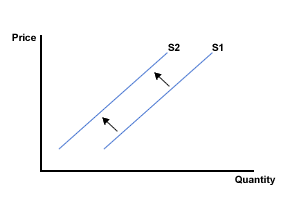Supply - short answer

Question 1
The table below represents the market for computers. For each of the changes given, tick the relevant column to show whether the supply curve has shifted either left or right or whether there has been an extension or contraction of supply (a move along the supply curve).
| Change | Shift right | Shift left | Extension in supply | Contraction in supply |
|---|---|---|---|---|
| There is an increase in real incomes | ||||
| A surplus of memory on world markets leads to a significant price fall for memory chips | ||||
| New capital equipment enables computer producers to build machines cheaper | ||||
| Labour costs for manufacture increase | ||||
| There is agreement by G8 countries to put a tax on computers | ||||
| Rapid growth in the developing world means increased demand for computers | ||||
| The development of TV-based interactive internet services |
Question 2

Supply curve shifting left
If the above supply curve is the supply curve for energy saving light bulbs, which of the following events may have caused the shift shown?
(a) A fall in price of a substitute for energy saving light bulbs
(b) A subsidy on the production of energy saving light bulbs
(c) A fall in labour costs for producing conventional light bulbs
(d) A fall in the price of raw materials required for manufacture
(e)
Anticipating a increase in demand, major manufacturers invest in new
capital equipment for the manufacturing of energy saving light bulbs
(f) A decrease in real incomes
Question 3
Which of the following is a reasonable explanation of the direct relationship between price and supply (the supply curve)? N.B. A number of them could be right.
(a) Improvements in technology help manufacturers to supply more at a lower price.
(b) As price of a good or service falls, firms will shift to producing other goods which become more profitable.
(c) At higher prices it is still profitable to use more expensive factors of production switched from other areas.
(d) At higher prices it is worthwhile producing more despite higher costs of production as the profit margin stays the same.
(e) Labour costs tend to increase each year.
